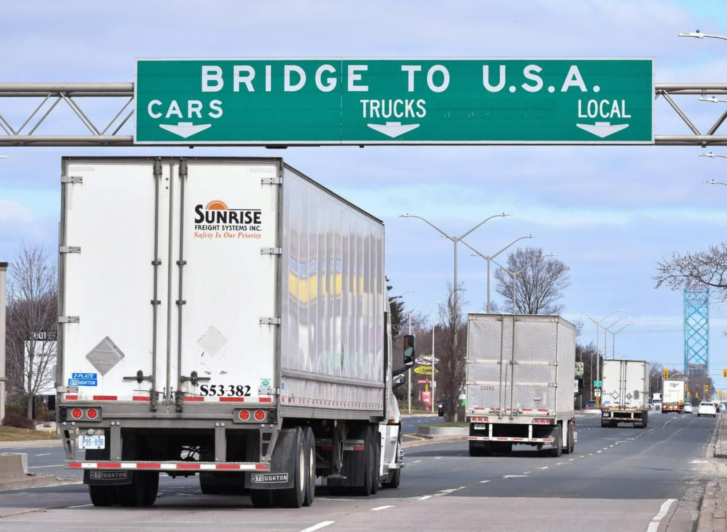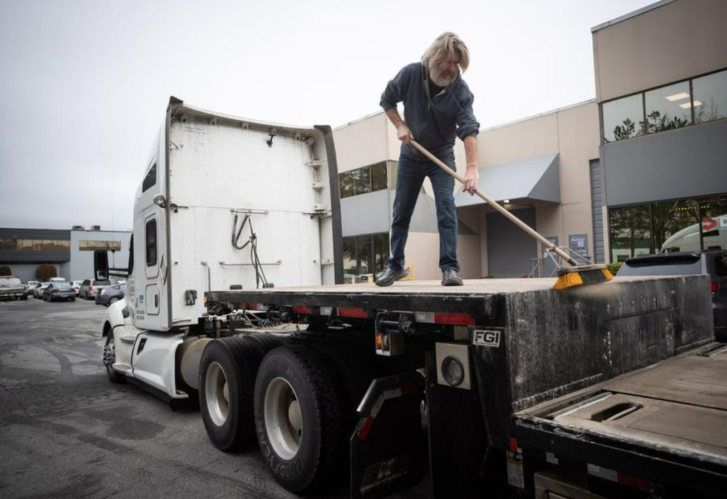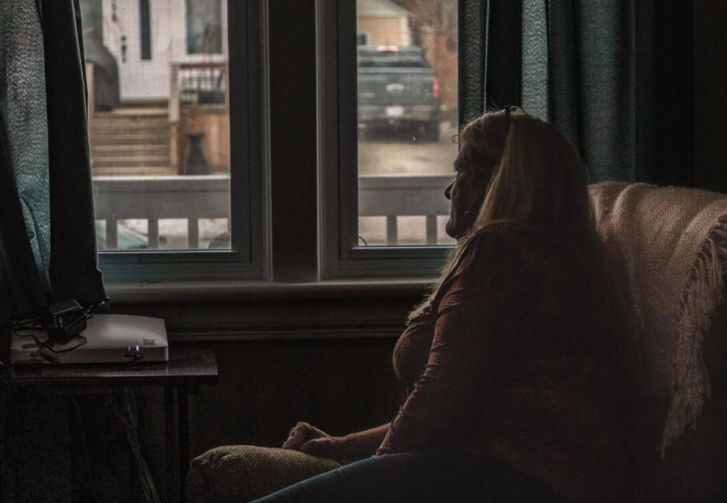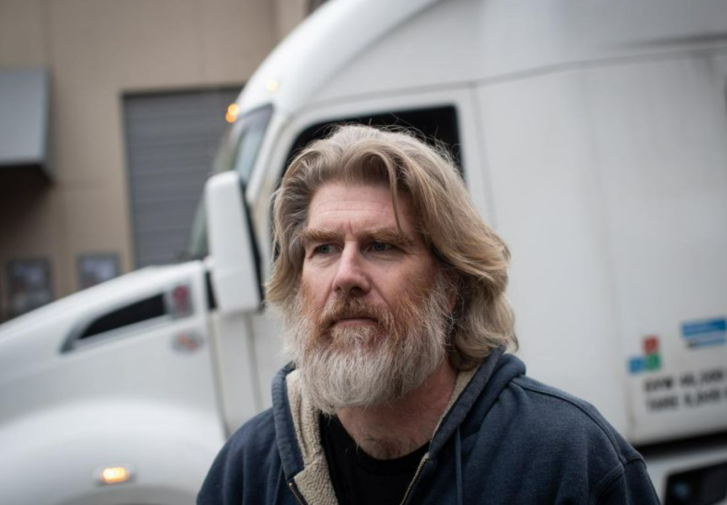From a Quebec health-care charge to a trucker mandate, costs for the unvaccinated in Canada are rising, pushing them further to the margins of society.
Greg Bates was driving between Calgary and Hamilton, a long-haul domestic route that would soon be the only kind of trucking he’s allowed to do.
The man from Olds, Alta., has been driving trucks for 15 years, most recently splitting his time between domestic trips and runs down to U.S. destinations. The U.S. trips can be more lucrative (and American highways often have better bathrooms and restaurants en route, in Bates’ opinion) but they’re now off-limits.
Bates is one of thousands of truckers who haven’t gotten the COVID-19 vaccine, and so won’t be eligible to drive into Canada from the U.S., without going into quarantine.
Though he says he wants the money from the America jobs, Bates says he wants to stick to his guns about the vaccine even more. He won’t get it, he says.
“I believe the shelves will be empty by April,” Bates said, predicting that the restrictions on truckers will further strain supply-chain.
“The ones that are fighting for freedom are in this situation.”

Bates is among the 21 per cent of Canadians who are not fully vaccinated. Those who have not taken the vaccine cite a variety of reasons — mistrust of the system and the scientists who invented the vaccine, the jab’s irreversibility, and simply “freedom” among them. The situation has raised thorny societal questions about balancing individual freedoms with the collective good, especially as unvaccinated people are more likely to be hospitalized with COVID-19, and increasing hospitalizations put a strain on the health-care system and increase calls for restrictions.
Whatever their reasons, it’s clear that the costs they’re accruing as a result of their refusal are only growing.

What this fall began as a patchwork of provincial COVID-19 vaccine passport systems encouraging people to get vaccinated by limiting certain activities — such as sports attendance and restaurant dining to those with proof of vaccination — has expanded. Federal workers and provincial workers in some provinces are now required to have the vaccine to work, and many big employers are making this a requirement, too. Any plane travel to, from or within Canada requires two doses. In Quebec, you will need to be fully vaccinated to buy liquor, and potentially pay an as-yet-undetermined tax for refusing the vaccine.
There’s some evidence that pressure on the unvaccinated in the form of mandates and passports incentivizes some to book their first appointments. Research from Simon Fraser University found a 66 per cent average increase of first-dose vaccine uptake in Canadian provinces upon the announcement of vaccine mandate rules. But those not swayed by the mandates can take the measures as just the latest reasons to distrust the vaccine and the medical system.
There’s also pressure on the unvaccinated in the form of words and emotion.
Prime Minister Justin Trudeau said publicly last week that vaccinated Canadians are “angry” with those who have not yet stepped up to get their shots. A recent survey by Maru Public Opinion found most respondents (60 per cent) agreed that unvaccinated people should be penalized in some way for their choice.

Ellen Alonzo is someone who says she’s felt hurt by statements like that. The grandmother and truck driver from Sarnia got the vaccine this September — but due to her husband’s previous experiences with a different vaccine, she was terrified to do it.
“I was in tears when I took my first shot because I knew that I can’t get this out of me once it’s in me,” she said. “I was backed into a corner because I would have never got it otherwise.”
The tipping point for Alonzo and her husband was that they kept reading about vaccine mandates, and thought they would eventually need to be vaccinated to be allowed to work.
“I’m tired of the divisions — and you see so much division over who has the shot and who doesn’t want the shots,” she said.
Many argue the pressure on the unvaccinated is all for the good, borrowing from French President Emmanuel Macron in saying that more pressure is what is needed to encourage those who have yet to take safe and effective vaccines. There is some evidence that Quebec’s additional restrictions have led, at least initially, to an increase in first-dose appointment bookings.

Yet there are online communities and Facebook groups that spread concerns about the vaccine. In Bates’ case, reading these sources has meant that he now says he really believes the vaccine could be dangerous to him.
Bates says he recently called a mental health hotline wanting to talk about his worries about potential vaccine side effects, and the mounting pressure to get the vaccine from mandates.
“They just hung up the phone,” he said. “It’s just proving to me that the vaccine is more important than anything else. More important than mental health.”
Bates says he feels like he’s being pushed further and further away from normal society, including his job, social and family connections.
Dr. Stefan Baral, a family and population health physician in Toronto, and professor at Johns Hopkins Bloomberg School of Public Health, says he’s been advocating for more than a year to approach people not yet vaccinated with more carrots and fewer sticks, partly to foster better relationships with people like Bates in the long term.
He’s concerned that people who mistrust the vaccine — or the medical system more generally — are more likely to be scared off by mandates than have their fears allayed.
His own conversations with unvaccinated Torontonians from marginalized communities have reinforced that.
“The experience that we’ve had with historically marginalized, or racialized communities, is that there are really significant challenges in terms of their fears and concerns that, I think, are worth listening to rather than steamrolling over,” he said. Requirements to get QR codes to access indoor spaces, or to have the vaccine to keep jobs, can make those conversations harder, he said.
“I think what we’re often doing is reinforcing their concerns that society is marginalizing them,” he said. “Even if (mandates and taxes) get us some additional vaccinations in the short term, I worry about what it will mean for relationships with marginalized communities down the road.”
That also applies, Baral said, to communities such as truck drivers, who are often overlooked but essential workers.
“From the beginning, there’s been no rapid testing for them, not an iota of resources for them to isolate when they come home,” Baral said. “If I was a trucker, I would feel upset that I hadn’t been provided any additional resources, and now it’s like they’re being blamed for bringing variants into the country.”
Bates, for his part, has mistrusted politicians and news sources for a long time, he said, choosing instead to use Facebook groups and chats to get his information.
Some of the information on these groups is exaggerated or false — such as claims that vaccine side effects are as bad as or worse than COVID-19 itself — but it comes from people he knows or recognizes as authorities.
With the information he’s relied on, Bates has come to distrust public messaging that says it’s his responsibility to get the jab. He keeps pointing to what he sees as contradictions. Why would a health order close gyms, where people go to get healthy? Why are there so many adverse events reported relating to the vaccine?
There are answers to these questions: That gyms can be vectors for transmission of the virus; and serious adverse events from vaccination are rare. But these answers aren’t showing up in the information venues Bates trusts, and vaccine mandates are making him more reluctant to reach out to look for another angle.
“It’s showing me I need to be against it,” he said.
He’s been thinking a lot lately about his worries about the vaccine, attributing symptoms of dementia in a family member to her having taken two doses.
“This vaccine thing is really killing me,” he said. “I don’t even care whether you have the vaccine or not, but just wake up: Do you want your freedoms or do you not want your freedoms?”
There is no scientific evidence that vaccines lead to dementia. Yet in the online communities Bates frequents, it’s considered plausible. People discuss all sorts of mysterious symptoms they attribute to vaccination.
Vaccinated family members plead with Bates to see reason, to look at the research showing vaccines are safe. He pleads back, offering up the sources of information he trusts. He’s clashed with his parents on the topic, and with his sister, who he visited in Texas.
“I argued with my family about this yesterday,” he said. “And now I’m done with my family.”
“If I can’t work from a severe adverse reaction, who is paying my bills?” he said. “It truly sucks to realize you are alone unless you have people in the same situation you are in. It is a very crappy feeling.”
Article From: The Star
Author: Alex McKeen

